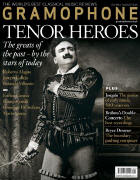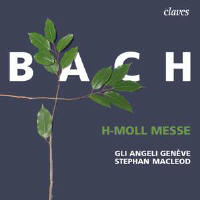Texte paru dans: / Appeared in: |
|
|
Outil de traduction (Très approximatif) |
|
|
Reviewer:
David Vickers Gli Angeli Genève perform the Mass in B minor with 10 singers (six concertists and four ripienists) and an orchestra of 27 players, each section led by outstanding musicians. Director (and bass) Stephan MacLeod enthuses that two singers on each line in the choruses, placed in front of the orchestra instead of behind it, is ‘more individualised, both in sound and interpretation … their respective timbres express their happiness and pleasure in letting music speak for itself’. The intricately balanced first phrases of the Kyrie give way in the fugue to warm legato strings and softly sustained oboes, and unfurling counterpoint is shaped compassionately by the singers (harpsichord continuo reinforcing the bass voices is a nice touch that enriches sonorities). Aleksandra Lewandowska and Marianne Beate Kielland’s dovetailing lines in ‘Christe eleison’ are shaded gracefully (the unison violins could be tidier). Heft from the trumpets and timpani and pinpoint precision from the voices make effective counterparts in ‘Gloria in excelsis Deo’, and the change at ‘Et in terra pax’ has surprising rhythmical charge. Kielland’s eloquent dialogue with violinist Leila Schayegh in ‘Laudamus te’ is judged perfectly, and ‘Domine Deus’ is sung sweetly by Zoë Brookshaw and Valerio Contaldo (its flute obbligato played by Alexis Kossenko with snappy Lombard rhythms). Oboist Emanuel Laporte and countertenor Alex Potter combine elegantly in ‘Qui sedes’, and the resonant colours in ‘Quoniam’ are relished by MacLeod, horn player Olivier Pichon and a pair of unbridled bassoons played fruitily by Tomasz Wesołowski and Hugo Rodriguez. Choruses with three trumpets tend to be quick and effervescent. On the other hand, there is consoling tenderness in ‘Et incarnatus est’ (the Pergolesian violins sigh quietly, with focus firmly on the voices), and long chains of twisting harmonic suspensions in ‘Crucifixus’ are sung beautifully by four concertists (the orchestral bass lines treading softly). The archaic five-part chorus ‘Confiteor’ feels a touch rushed, although the sudden switch of mood and texture at the transition into ‘Et exspecto’ has admirable clarity and solemnity. The six-part Sanctus is fast and has plenty of ebb and flow between the upper voices and instruments – although more presence from the swinging octaves in the bass would not have gone amiss. The fugue ‘Pleni sunt coeli’ is a compound of energy and poise, and each iteration of the ‘Osanna in excelsis’ is spiritedly virtuoso. There is imploring succour in Potter’s Agnus Dei in partnership with long cantabile phrases from unison violins. Overall, Gli Angeli Genève’s performance is characterised by swift momentum, crisp articulation and benevolent attention to detail. |
|




